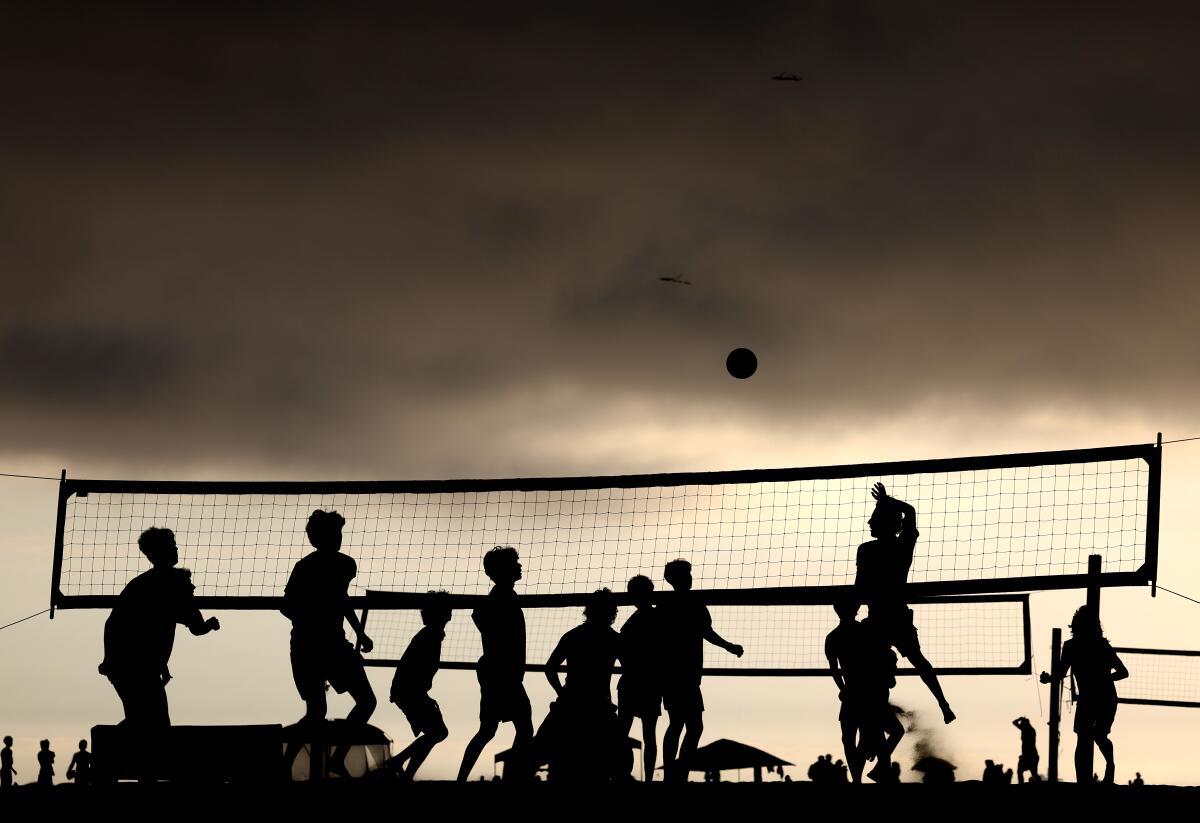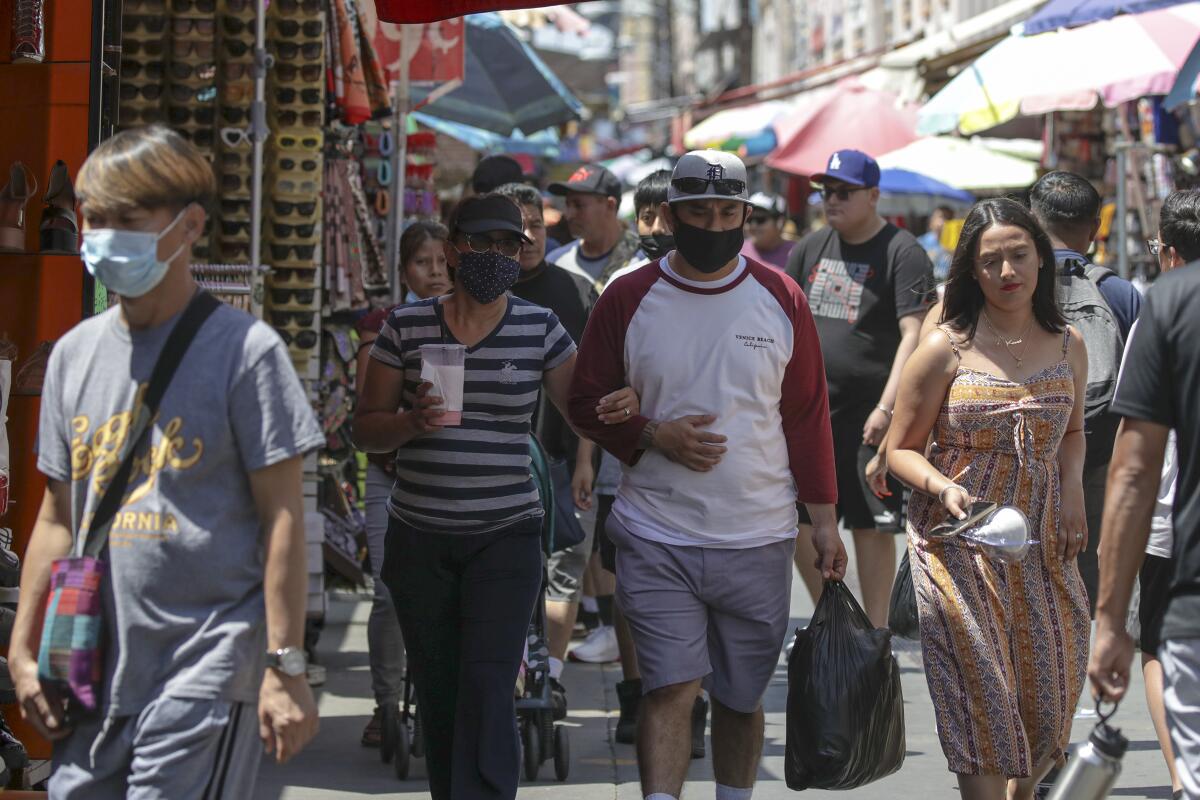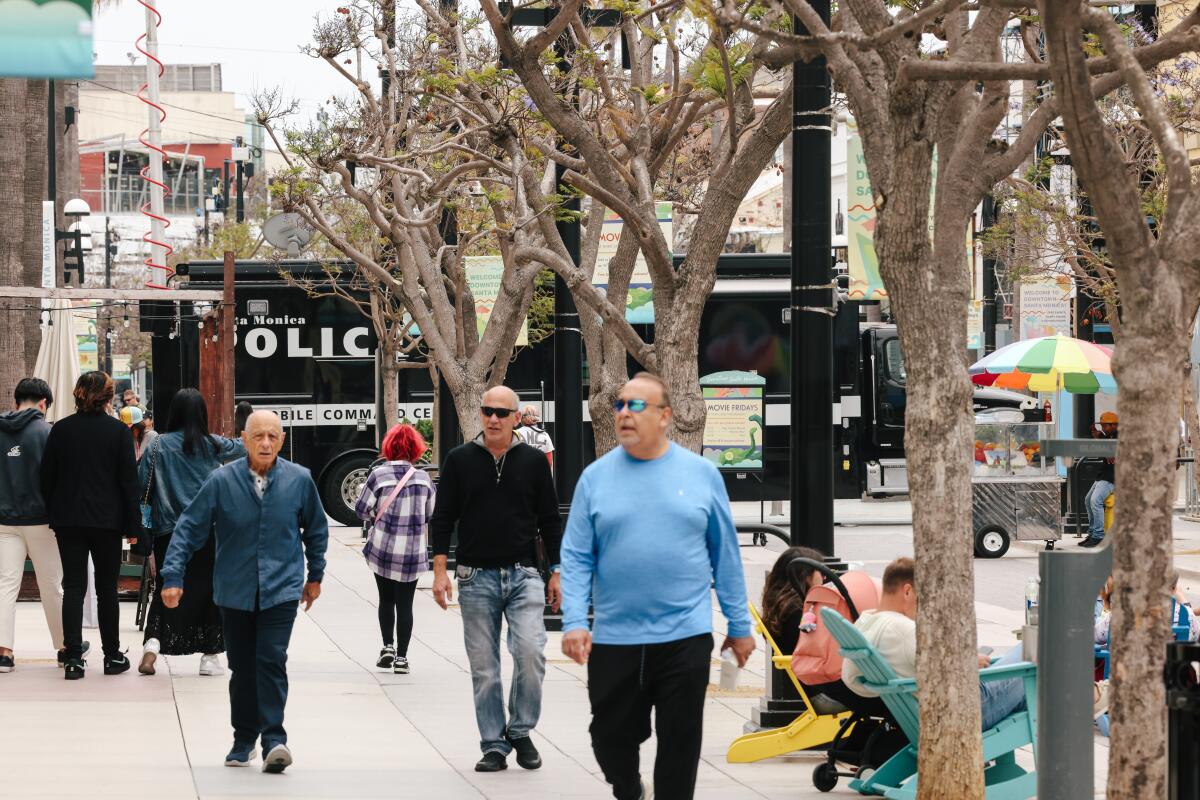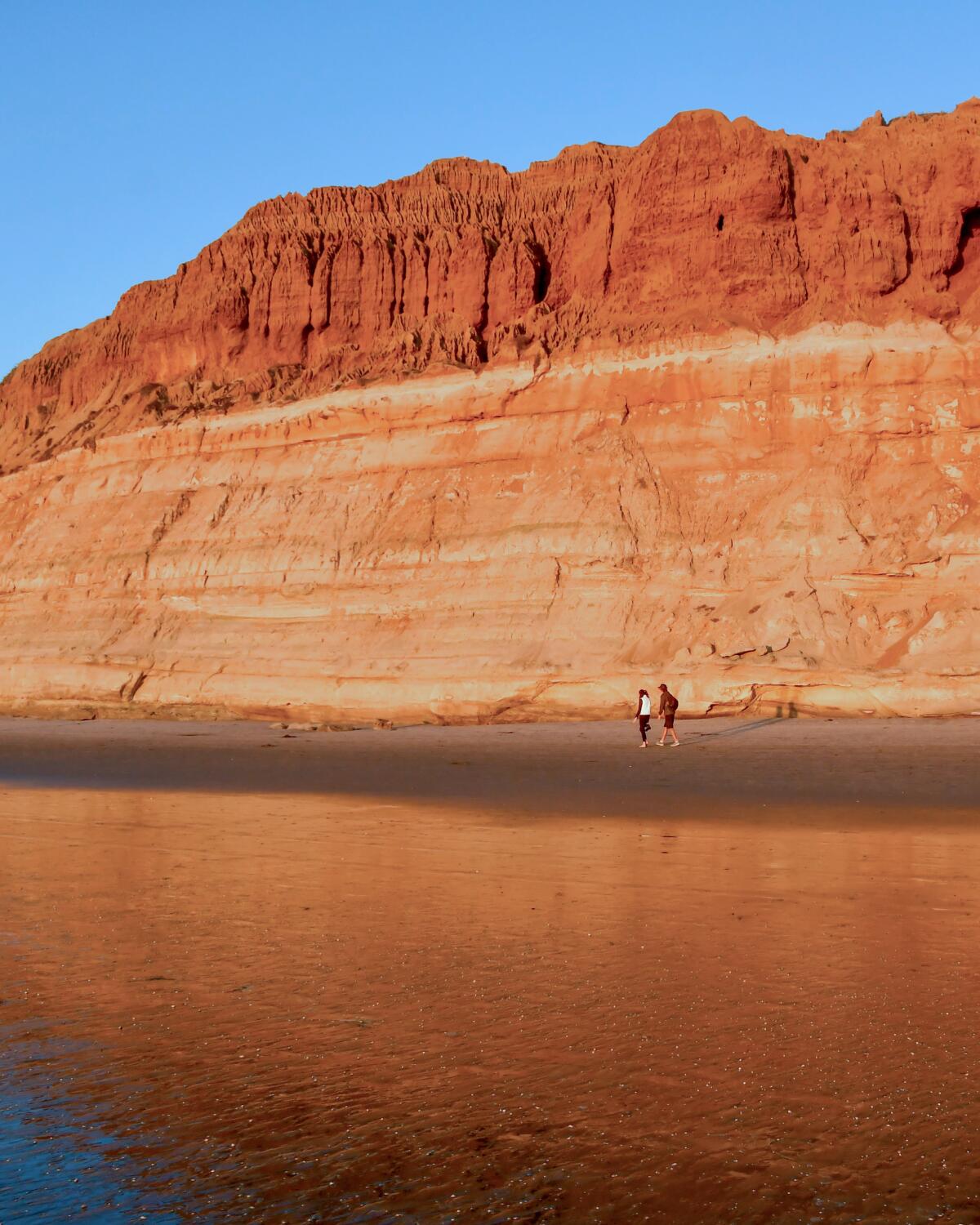California’s summer vibe is post-COVID. The data are not

Good morning. It’s Wednesday, July 17. Here’s what you need to know to start your day.
- COVID is rising again. Does anybody care?
- Multiple security failures allowed would-be assassin to get clear shot at Trump.
- Santa Monica’s Third Street Promenade is a retail relic. Can it be saved?
- And here’s today’s e-newspaper
You're reading the Essential California newsletter
Our reporters guide you through our biggest news, features and recommendations every morning
You may occasionally receive promotional content from the Los Angeles Times.
COVID is crashing California’s summer
The summer COVID bump is not stopping, unlike many of our concerns about getting infected from summers past.
I’ll include myself in that group.
During a journalism industry event I attended over the weekend, I shared a banquet room with hundreds of people, plus smaller rooms for panel discussions. I saw only one person wearing a mask and it stood out; there was someone being cautious at a level I no longer am in daily life.
If I hadn’t spotted that mask, I don’t know that COVID would have crossed my mind. I’ve been getting my boosters. I don’t mask up in my day-to-day anymore, but I still have masks on hand for air travel. Like many Californians and Americans, my guard is mostly down.
A Pew Research Center survey conducted in March found that just 20% of U.S. adults consider the coronavirus a major public health threat. Just 10% said they felt very concerned about getting COVID and having to be hospitalized because of it, while 12% reported feeling very concerned they might unknowingly spread the virus to others.

We’re now in our fifth summer living with COVID, and we’re over it — even as the data show the virus continues to mutate and spread more easily. The subvariants known as FLiRT now dominate the U.S. caseload, as my Times colleague Rong-Gong Lin II reported this week:
“For the two-week period that ended July 6, an estimated 70.5% of COVID specimens nationwide were of the FLiRT subvariants — officially known as KP.3, KP.2 and KP.1.1 — up from 54.9% a month earlier.”
California is one of seven states with “very high” COVID levels in its wastewater, according to the CDC, and estimated to be significantly higher than last summer.
According to state health data, the seven-day positivity rate reached 13% on July 8. Of course, that’s an undercount, since it does not include at-home tests or the people who catch COVID but don’t test at all.
But look around and you’ll probably notice that we’re traveling, gathering and partying like it’s 2019.
“Certainly, people are trying to get back to whatever life was like before the pandemic,” Dr. Elizabeth Hudson, regional chief of infectious disease at Kaiser Permanente Southern California, told Rong-Gong. “We’re in a different place than we were before. ... However, good common sense shouldn’t go out the window.”
The simplest safeguard tries to employ some of that common sense: If you’re sick, stay home and isolate. And get tested to have a better sense of what you’re dealing with.
COVID symptoms vary, but often include fever, aches, sore throat, chills, fatigue, cough, runny nose and headaches. Although vomiting, diarrhea and stomachaches are less common, they can still be the result of a COVID infection.
Health officials advise people to wear masks for five days after their symptoms improve to protect others. To keep the elderly, immunocompromised and other high-risk people safe, L.A. County recommends anyone infected steer clear for 10 days after a positive test or the start of symptoms.
As COVID continues to rise this summer, we want to hear from you, newsletter readers:
How concerned are you about COVID right now? How often is it on your mind in daily life?
How have the precautions you take changed over time — or have they not? Do you think the average person is taking it more or less seriously than you are?
Share your concerns (or lack thereof) by taking this survey and you might see your and fellow readers’ responses in a future edition of Essential California.
More on COVID:
- Inside the legal drama embroiling a Pasadena startup that grossed billions selling COVID tests
Today’s top stories

California and the 2024 election
- California’s delegation could play a pivotal role at the DNC — depending on Biden.
- California Republicans, long in the minority at home, get a Trump boost at RNC.
- Republicans are mentioning ‘Ka-MAL-a’ a lot. But Trump shooting lowers pressure on Biden to drop out.
- Trump was nearly killed in their small town. Now they grapple with politics, grief and anger
Elon Musk v. California
- Citing street crime and new transgender school law he calls the last straw, Elon Musk says he is moving the headquarters of SpaceX and X from California to Texas.
- Newsom signed a bill banning schools from notifying parents about student gender identity early this week.
L.A. politics
- Mayor Karen Bass vetoes ballot proposal to let police chief fire problem officers.
- L.A. County wants to give evicted tenants free lawyers. Landlords say it won’t help.
- South L.A. tenants living with mold, rats and roaches say history is happening again.
Sports
- Ingrid Andress is headed to rehab after ‘drunk’ butchering of national anthem at MLB derby.
- Is Bronny James a pro? The NBA Finals MVP thinks he’s with Lakers ‘because of his name.’
- Lakers to hire Lindsey Harding as team’s first female assistant coach.
More big stories
- Former Stanford dean, now local council member, apologizes for affair with student.
- U.S sanctions Mexican accountants and firms over cartel-linked timeshare scams.
- Burglars made off with over 300 guns by smashing cars into stores, prosecutors say.
- Amid Baldwin furor, ‘Rust’ armorer Hannah Gutierrez wants case dismissed too.
- Beloved gorilla Winston, second oldest in the U.S., euthanized at San Diego Zoo.
Get unlimited access to the Los Angeles Times. Subscribe here.
Commentary and opinions
- Gustavo Arellano: I know what a true hillbilly is, and it’s not J.D. Vance.
- Mary McNamara: Trump betrays call for unity by embracing J.D. Vance, Marjorie Taylor Greene.
- Mark Z. Barabak and Anita Chabria: Trump’s crowning of J.D. Vance, and what it means for the MAGA movement
- Robin Abcarian: Don’t let political rhetoric distract you from this truth about the Trump shooting
- Michael Hiltzik: Why hugely profitable corporations don’t spend enough to keep hackers from stealing their customers’ info
Today’s great reads

MLB players with Vegas roots are skeptical of A’s relocation: ‘It’s a terrible idea’ Athletics owner John Fisher says moving to Las Vegas will improve the franchise, but Paul Sewald, Bryce Harper and other players don’t see it that way.
Other great reads
- Nicole Kidman on marriage, marijuana and the making of Stanley Kubrick’s ‘Eyes Wide Shut.’
- Exclusive: Michael Mann unveils his in-depth, behind-the-scenes Archives project.
- He led UCLA to NCAA titles. Can John Speraw guide U.S. men’s volleyball to gold?
How can we make this newsletter more useful? Send comments to [email protected].
For your downtime
Going out
- Santa Monica’s Third Street Promenade is a retail relic. Can it be saved?
- What is a Bojin facial? The L.A. treatment that feels like ‘gua sha on steroids’
Staying in
- This novel co-written by Keanu Reeves is actually great.
- 🧑🍳 Here’s a recipe for Sesame Cold Noodles With Crab and Crunchy Vegetables.
- ✏️ Get our free daily crossword puzzle, sudoku, word search and arcade games.
And finally ... a great photo
Show us your favorite place in California! We’re running low on submissions. Send us photos that scream California and we may feature them in an edition of Essential California.
Today’s great photo is from staff photographer Christopher Reynolds of the colorful cliff faces at Torrey Pines State Beach in San Diego. It’s on our new list of the 50 best beaches in SoCal.
Have a great day, from the Essential California team
Ryan Fonseca, reporter
Christian Orozco, assistant editor
Karim Doumar, head of newsletters
Check our top stories, topics and the latest articles on latimes.com.
Sign up for Essential California
The most important California stories and recommendations in your inbox every morning.
You may occasionally receive promotional content from the Los Angeles Times.






